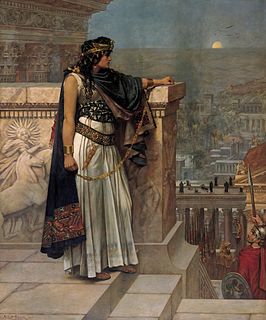Related Research Articles
The Mysterious Husband is a play by the British writer Richard Cumberland. It is a Domestic drama with a tragic ending, first performed in 1783. Along with several other Cumberland plays it was influenced by the 1768 gothic play The Mysterious Mother by Horace Walpole.

The Fair Circassian is a 1781 tragedy by the British writer Samuel Jackson Pratt. It is an adaptation of the novel Almoran and Hamet by John Hawkesworth. He wrote the lead role for his friend Sarah Siddons, but due to other commitments it ended up being played by Elizabeth Farren.
The Female Fortune Teller is a 1726 comedy play by the British writer Charles Johnson. It is a reworking of Edward Ravenscroft's 1683 restoration comedy Dame Dobson.
William Burnaby (1673-1706) was an English writer, primarily known for authoring several plays in the early eighteenth century. Three of his works were late entries into the Restoration Comedy tradition.
The Dissembled Wanton is a 1726 comedy play by the British writer Leonard Welsted.
The Universal Passion is a 1737 comedy play by the British writer James Miller. It is a reworking of Shakespeare's Much Ado About Nothing.

The Humours of Oxford is a 1730 comedy play by the British writer James Miller. It was Miller's debut play, inspired by his time at Wadham College, and proved popular. The plot is set around Oxford University and portrays the academics as overindulging in port wine. William Hogarth designed the frontispiece of the published version of the play.
The Mother-in-Law is a 1734 comedy play by the British writer James Miller. Also known by the longer title The Mother-in-Law, or the Doctor the Disease it debuted at the Haymarket Theatre in London.
Periander is a 1731 tragedy by the British writer John Tracy. It is based on the life of Periander, the Ancient Greek ruler of Corinth.
Merope is a 1731 tragedy by the British writer George Jeffreys. It takes place in Ancient Greece, based around the myth of Merope. Voltaire wrote his own play Mérope on the subject in 1743.
The Rival Modes is a 1727 comedy play by the British writer James Moore Smythe.
The Different Widows is a 1703 comedy play by the British writer Mary Pix.

The Country Lasses: or, The Custom of the Manor is a 1715 comedy play by the British writer Charles Johnson.
The Female Advocates is a 1713 comedy play by the British writer William Taverner. The longer title is The Female Advocates: or, the Frantic Stock-jobber.
The Apparition: or, The Sham Wedding is a 1713 British comedy play written by an anonymous author.
The School for Vanity is a 1783 comedy play by the British writer Samuel Jackson Pratt.

The Grecian Daughter is a 1772 tragedy by the Irish writer Arthur Murphy.

Zenobia is a 1768 tragedy by the Irish writer Arthur Murphy. It is based on the life of Zenobia, ruler of the Palmyrene Empire in Syria and her defiance of Ancient Rome.
Zingis is a 1768 tragedy by the British writer Alexander Dow. It is set during the reign of Tamerlane.
The Law of Lombardy is a 1779 tragedy by the Irish writer Robert Jephson.